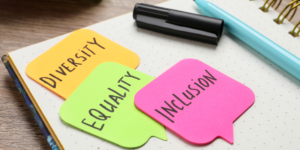They say variety is the spice of life. If we were all the same, the world would be a very dull place. Just as diversity adds colour to our world, inclusive workplaces add colour to the world of work. This allows not only employees but also businesses and wider society to shine.
This LQBTQ+ History Month, let’s shine a spotlight on why inclusive workplaces are so important for UK businesses and how we can all do more to support inclusive workplaces.
What Is An Inclusive Workplace?
At this point, I’d like to explain the definition of an inclusive workplace. Put simply; it refers to a work environment where everyone feels valued regardless of their background, race, gender or who they choose to love.
An inclusive workplace isn’t about pretending everyone is the same. Rather, it acknowledges that everyone is different but also recognising that these differences add value to a business’s culture and outcomes.

Why An Inclusive Workplace Is So Important
An inclusive workplace sets an organisation up for success in many ways. When you bring people from different cultures and backgrounds together, they all bring their own unique ideas. This can help a business shift to new ways of working that improve productivity, communication and outcomes.
The UK is a wonderful blend of people of different races, genders and socio-economic classes. An inclusive workplace can spot changes to the market and consumer behaviour coming down the tracks more easily and adjust accordingly because the company better reflects the society it serves.
We do our best work when we’re happy. It may seem obvious, but companies that promote diversity and inclusion just make their employees feel better about working there. Happiness at work allows employees to thrive, boosting productivity and, therefore helping the business thrive.

How Does A Business Create An Inclusive Workplace?
We’ve seen how critical an inclusive workplace is to a business’s ability to grow and thrive, but how does an organisation go about creating one?
Education is a powerful tool that anyone in a business can benefit from, from the top down. Having training or educational programmes available that help employees understand inclusion will go a long way to getting a workforce on the same page.
Once everyone understands what an inclusive workplace is and why it’s important, everyone can work towards creating it.
Practising inclusive leadership is key to creating an inclusive workplace. This involves welcoming the input of colleagues from different backgrounds whose ideas may be different to yours, as well as enabling constructive arguments and listening to and acting on the advice of diverse employees.
Leaders who create environments around them where employees feel valued and listened to encourages people to speak up and share their thoughts. This opens doors to more collaboration and innovation.
Can We Do More During LGBTQ+ History Month?
As I mentioned earlier, when it comes to embracing diversity, the best tool we have is education. When we educate ourselves about the struggles of those battling homophobic and transphobic discrimination, we become an ally for people who struggle to be heard.
That’s why I’d now like to shine a light on the UK Black Pride movement. What started off as a single event in London in 2005 has grown to become the biggest event of its kind in Europe, attracting thousands of people every year.
The legacy of the UK Black Pride movement will go a long way to creating a united and resilient society where everyone’s right to be exactly who they are is celebrated and protected. If you’d like to find out more about the movement, I’d recommend checking out its website here.
Final Thoughts
LQBTQ+ History Month gives us a chance to reflect on the past and look ahead to the future. There is still a lot of work to do when it comes to creating more inclusive workplaces in the UK. However, with trailblazing organisations like UK Black Pride leading the charge, a future where everyone is celebrated and recognised for who they are may just be within reach.










